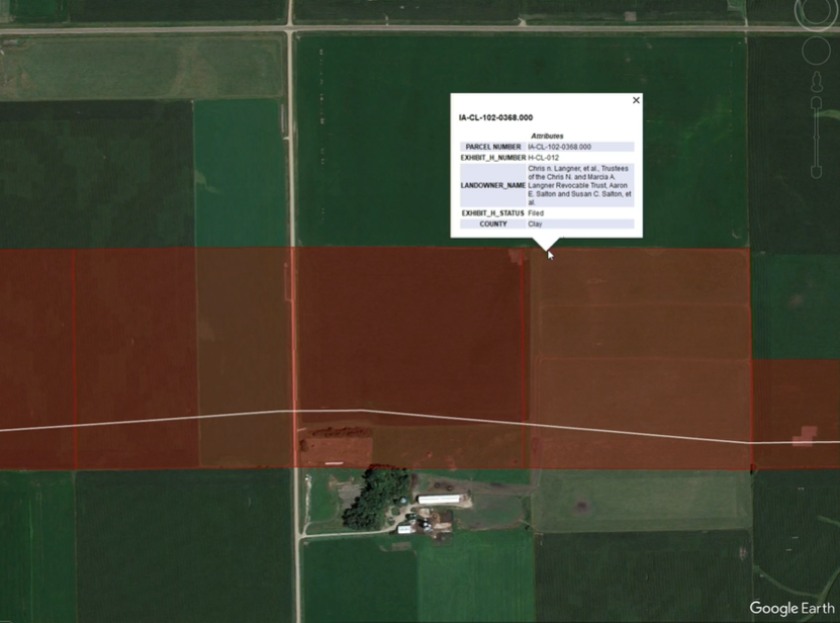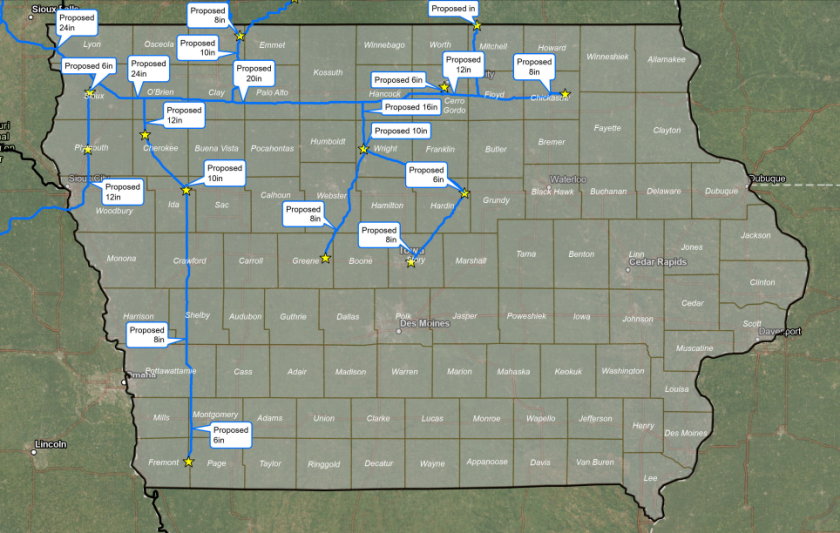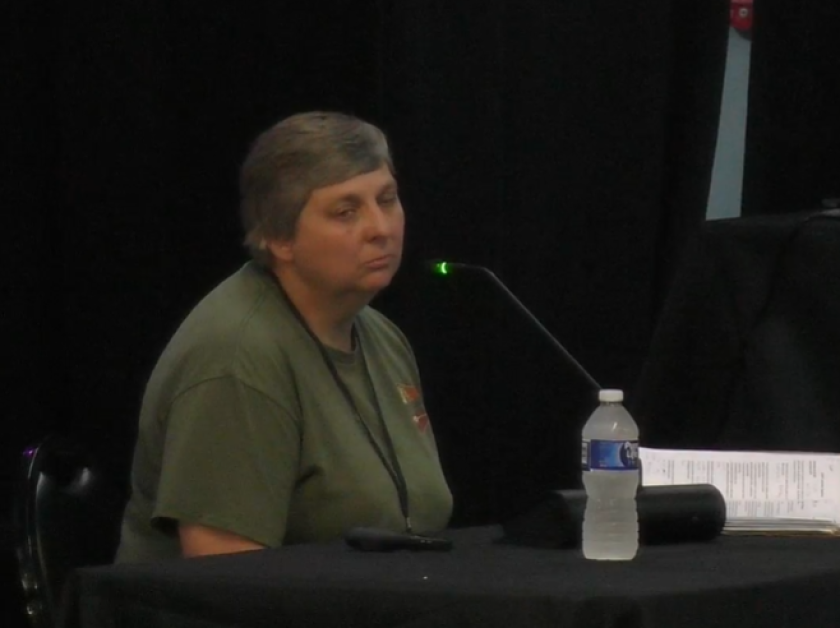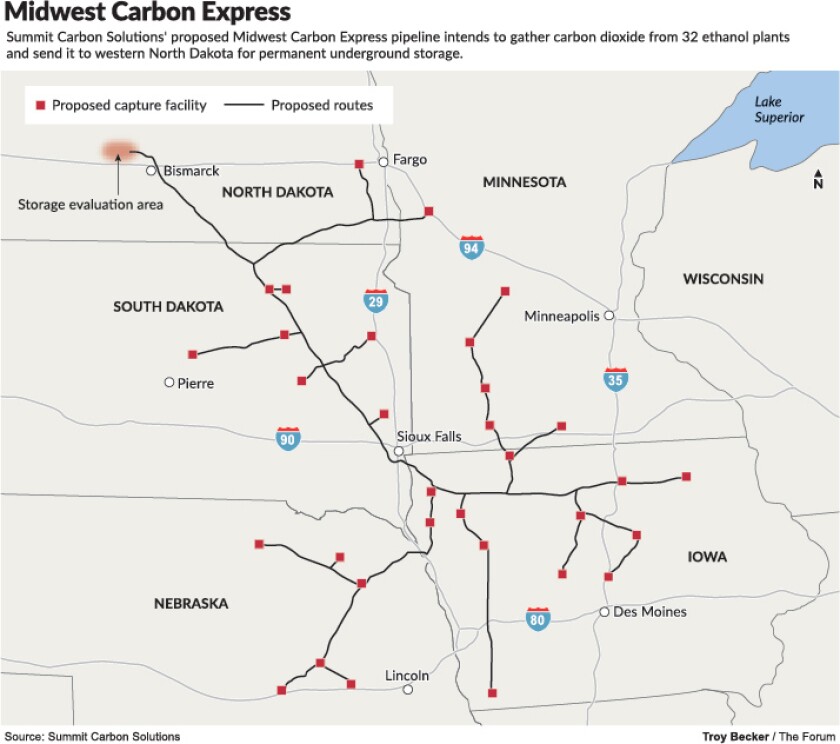FORT DODGE, Iowa — The Iowa Utilities Board got right to the question of eminent domain as it considers the controversial carbon pipeline project from Summit Carbon Solutions.
Property owners who have refused to sign a voluntary easement were on the witness stand on Tuesday, Aug. 22, the first day of what will likely be a months-long trial-like hearing on Summit’s pipeline application.
ADVERTISEMENT
Marcia Langner who lives in Clay County near Ayrshire, Iowa, testified that Summit representatives “harassed” her 93-year-old mother and went back on promises to notify them when surveyors would be on their property.
Iowa-based Summit is trying to secure permits for a five-state, 2,000-mile pipeline that would take greenhouse gas emissions from ethanol plants and send it to North Dakota for underground storage.
Approval from the Iowa Utilities Board would automatically grant Summit the right of eminent domain, allowing them to use the court system to force landowners to provide right-of-way.
Langner cited several issues why her family doesn’t want the hazardous liquid pipeline running through her diversified farm.
: Langner said their property is pattern tiled, as is a lot of Iowa farmland. “I can't imagine that there will be no tile problems. Even with the best of intentions, I think that the odds of having tile broken and damaged during construction would likely occur. I also believe compaction is going to be an issue,” she said.
Livestock: The proposed pipeline would run close to the barns where Langners do calving and cited concerns about having to move cattle during construction and long-term effects on the calving area and nearby pastures.
Wetlands: There is a wetland on the property. When asked if she thought construction would damage the wetland, she replied, “Well it’s not going to help them.”
ADVERTISEMENT
Weeds: “One of the things that I was reading is that they would have 45 days to deal with a weed issue,” Langner said. “And if you let weeds grow for 45 days without doing anything about them, that could be an economic issue as well.”

Langner said they asked Summit surveyors to notify them when they would be on the property, but she cited two occasions when they did not. She said the surveyors disturbed cattle during calving season and risked exposing themselves to chemicals after spraying. She said proper notice could have avoided that.
“This process already has shown disrespect for landowner rights by allowing surveyors to enter unannounced,” she said.
She said they also asked Summit not to contact her mother, who is 93 and in an assisted living facility and was assured she would be left alone. But she said she was contacted, anyway.
“She had been harassed by various summit representatives on multiple occasions,” she said. “The Summit representatives have used unethical tactics, they have continuously disrupted our workday even after being repeatedly told we were not interested in signing these easement agreements.”
Summit has said during Iowa legislative hearings that it needs eminent domain to complete the projects, which it says will benefit the ethanol industry and corn growers that supply the ethanol plants.

ADVERTISEMENT
Getting started
Langner and other non-intervenor property owners testified in the afternoon. The morning was spent on procedural questions, for the hearing process involving more than 50 intervenors.
A Summit attorney referenced more than 10,000 pages of written testimony from attorney Brian Jorde, who represents landowners in multiple states.
He bemoaned the uncertainty of not knowing when landowners may be called on to testify in the coming months.
When he asked for some clarity on when Summit might start presenting its case, he was referred to planned weekly summaries from the IUB and weekly schedule to be put out on Thursdays for witnesses for the upcoming week.
“Well, I guess we’ll do the best we can with that,” Jorde said.
Dakota Access
Summit attorneys asked a limited number of questions for the three landowners that testified Tuesday. More landowners were set to testify on Wednesday at 8:30 a.m.
Nelva Huitink is a dairy farmer from Hospers, Iowa, in Sioux County. Her family’s farm also has the running through it. She said this summer, a sinkhole developed over the pipeline, six years after construction.
ADVERTISEMENT

“I know Summit Carbon at their informational meeting said to us, ‘you'll never know that we have touched your land.’ Dakota Access said the same thing,” she said.









